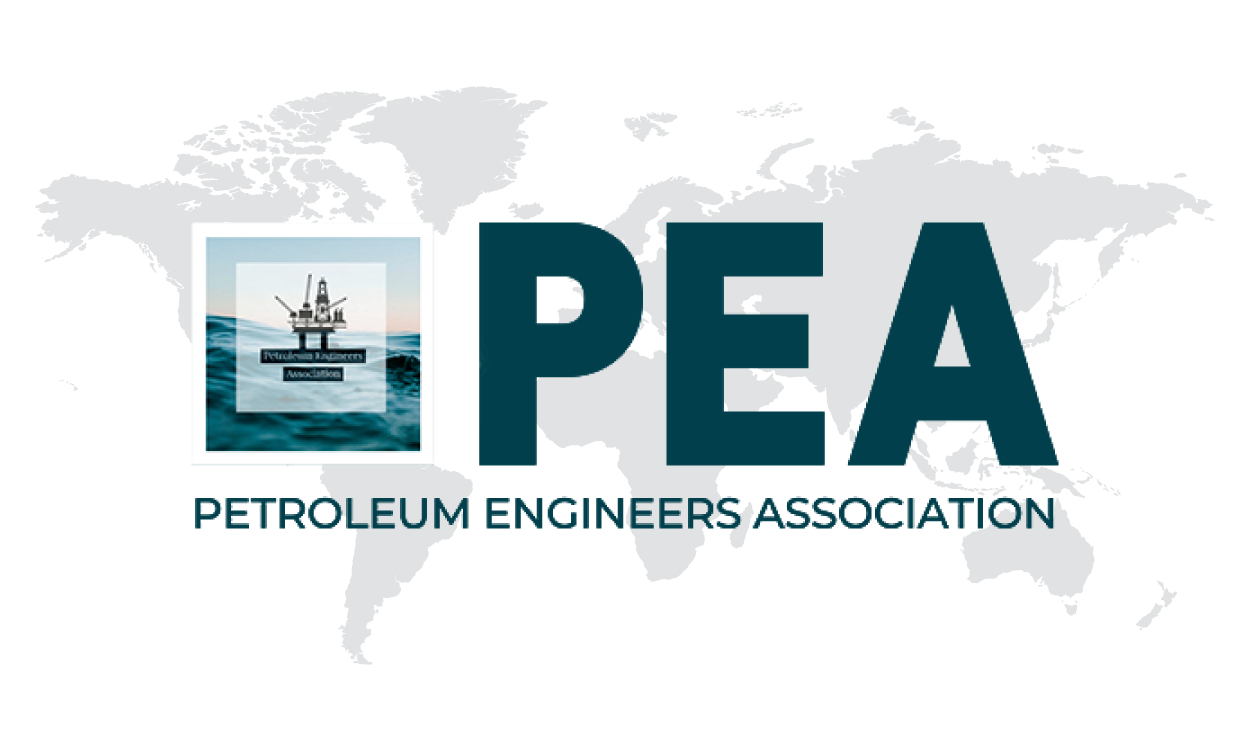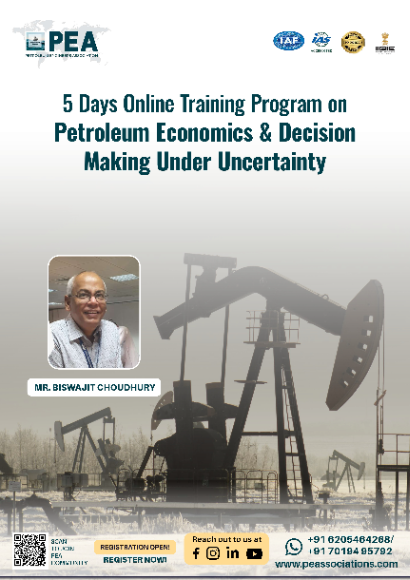Petroleum Economics & Decision Making Under Uncertainty
| Code | Date | Time | Duration | Location | Currency | Team of 10 Per Person | Team of 7 Per Person | Early Bird Fee Per Person | Normal Fee Per Person |
|---|---|---|---|---|---|---|---|---|---|
| PPE26 | 05 - 09 Oct 2026 | 7 PM Indian Time |
3 Hours Per Day
|
Zoom Online
|
USD
|
750
|
850
|
1000
|
1500
|
The Classes Will be from Monday to Friday Via Zoom Online.
Boost your team's skills and your budget! Enjoy group discounts for collaborative learning. Send an inquiry to info@peassociations.com.
Petroleum Economics & Decision Making Under Uncertainty
By joining the course, participants will learn why project economics are vital in upstream oil and gas projects. They will also learn about the project lifecycle. During the course, common types of oil and gas upstream projects will be presented.
A number of numerical problems using Microsoft Excel will be used in the class to illustrate the various principles.
Description
This course is designed for learning the principles of petroleum economics and project evaluation. Several key concepts that will be discussed are the time value of money, cash flow, common economic indicators, fiscal systems and project evaluation fundamentals. An introduction to risk analysis will also be presented.
Demo Class
This course is designed for learning the principles of petroleum economics and project evaluation. Several key concepts that will be discussed are the time value of money, cash flow, common economic indicators, fiscal systems and project evaluation fundamentals. An introduction to risk analysis will also be presented.
The objective of the course is to introduce the participants to fundamental principles of petroleum economics and project evaluation.
The training sessions will comprise traditional presentations, real life case study examples and solving simple numerical problems in Microsoft Excel to understand the fundamental concepts.
Any upstream oil and gas company will benefit from training its personnel in Petroleum Economics by improving their ability to make informed investment decisions, leading to better project profitability and risk management.
Joining this training in Petroleum Economics will broaden your knowledge of economic concepts like NPV, IRR, and fiscal systems, making yourself more equipped to handle project evaluations and negotiations. It will enhance your decision-making skills by teaching how to evaluate investments and manage risks in the oil and gas industry.
This course is ideal for professionals involved in the oil and gas industry, including engineers, geologists, and project managers who need to understand the economic aspects of their projects. It is also beneficial for financial analysts, business development personnel, and decision-makers responsible for investment evaluations and cost management.
Day 1: Petroleum Industry Value Chain and Upstream Projects
Covers oil and gas lifecycle from exploration and production to refining, transportation, and marketing, highlighting value addition at each stage. Focuses on exploration (geological surveys, seismic analysis, drilling), development (appraisal drilling, reservoir engineering, feasibility studies, facility design), production (well operations, optimization, enhanced recovery), and project lifecycle (exploration to abandonment with risks and uncertainties).
Day 2: Financial Analysis in Upstream Oil and Gas
Explains cash flow models for oil and gas projects, covering revenue, capital expenditures (CAPEX: exploration, drilling, facility costs), and operating expenses (OPEX: production, maintenance, transportation, labor). Reviews depreciation methods (straight-line, declining balance, units of production) and their economic impact. Discusses fiscal terms like royalties, production taxes, and income taxes affecting profitability.
Day 3: Time Value of Money and Economic Evaluation
Introduces time value of money, emphasizing money’s earning potential. Covers discounted cash flow (DCF) analysis to assess project profitability. Explains economic indicators: Net Present Value (NPV: inflows minus outflows), Internal Rate of Return (IRR: discount rate for zero NPV), Value Investment Ratio (VIR: cash flow to investment ratio), Payback Period (time to recover investment), Break-Even Price (price for economic viability), and Profitability Index (value per investment unit).
Day 4: Fiscal Regimes in the Petroleum Industry
Outlines government revenue methods: Service Contracts, Production Sharing Contracts (PSCs: government owns resources, companies share production after cost recovery), and Tax and Royalty Systems (taxes and royalties on production). Explains cash flow modeling to assess fiscal impacts and analyzes government revenue share under different fiscal terms.
Day 5: Decision Making and Risk Assessment
Addresses uncertainties in oil and gas projects (reservoir size, production rates, prices, costs, fiscal terms). Covers Expected Monetary Value (EMV: weighted average outcomes), Decision Tree Analysis (graphical tool for investment decisions), Sensitivity Analysis (impact of variable changes like oil price), Scenario Analysis (performance under scenarios like low or high oil price), and Monte Carlo Simulation (random sampling to model uncertainty and estimate outcomes).
On successful completion of this training course, PEA Certificate will be awarded to the delegates

Biswajit Choudhury is a Reservoir Engineer with about 40 years of experience in oil and gas industry. During his long career he has worked for Oil India Limited, BG Group, Shell International and Petroleum Development Oman. He was the technical authority in Reservoir Engineering function in Shell International and Petroleum Development Oman. Biswajit has presented several technical papers in international conferences and has 12 publications in international journals. Currently as a Freelance Reservoir Engineering Consultant, he is associated with IMC Limited and Petroleum Engineers Association (PEA). He delivers several technical courses both online and in face-to-face mode and is a guest faculty at IIT (ISM) Dhanbad and IIT (Madras). Biswajit has BS and MS degree in Petroleum Engineering from IIT (ISM) Dhanbad.
Frequently Asked Questions
All course bookings made through PEA are strictly non-refundable. By registering for a course, you acknowledge and accept that all fees are payable in full and are not subject to refund under any circumstances, including changes in personal or professional commitments or partial attendance.
PEA reserves the right to make reasonable adjustments to course content, trainers, or schedules where necessary, without entitling delegates to a refund. Comprehensive details of each course — including objectives, target audience, and content — are clearly outlined before enrolment, and it is the responsibility of the delegate to ensure the course's suitability prior to booking.
For any inquiries related to cancellations or bookings, please contact our support team, who will be happy to assist you.



